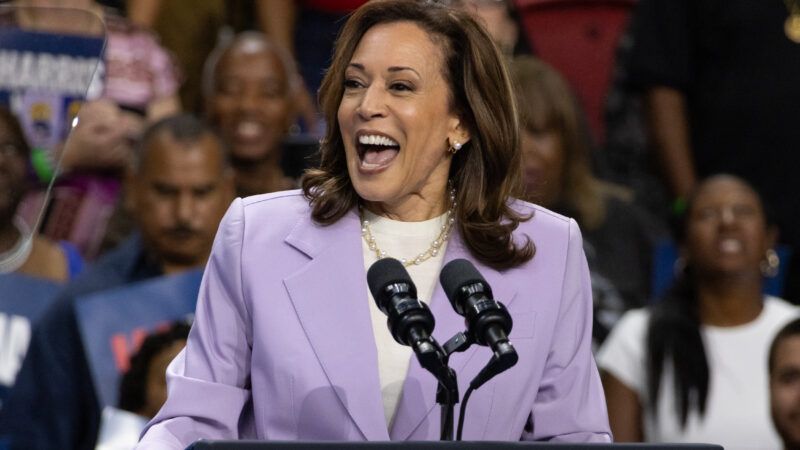Carving Out a Tax Cut Just for Tips Doesn't Make More Sense When Kamala Harris Does It
Exempting tips from the federal income tax would add to the deficit and unfairly penalize nontipped workers. It's a bad idea no matter who is pitching it.

No matter who wins this year's presidential election, tipped service workers might be getting a nice new tax break.
Vice President Kamala Harris has followed in former President Donald Trump's footsteps by promising to eliminate income taxes on tips if she's elected. Trump, meanwhile, is already complaining that she's stolen the idea from him—although isn't it supposed to be a triumph when you convince an opposing campaign to adopt your views?
Cutting taxes for tips has already gained minimal traction in Congress too. Sen. Ted Cruz (R–Texas) and some House Republicans have drafted a bill that puts a few bones on the Trump (and now Harris) proposal.
Unfortunately, this is a poorly thought-out idea no matter whose campaign is pushing it. As I wrote shortly after Trump floated this plan in June, exempting tips from income taxes would increase the deficit, create some weird economic incentives, and unfairly cut taxes for a small subset of workers while not doing much to help the majority of Americans or grow the economy.
Those things are all still true, even when the silly idea comes out of a Democratic politician's mouth. Don't buy the argument being peddled by people such as Los Angeles Times columnist Michael Hiltzik, who declared Harris' version of this plan "better" simply because she's also calling for a higher national minimum wage.
If anything, given Harris' track record of talking about equity and fairness, her embrace of this idea looks worse than Trump's decision to throw it out there in the first place. There's no way around it: This would be a very unfair proposal for a lot of low-income workers.
Alex Muresianu, a senior policy analyst at The Tax Foundation, spells out in detail why that's the case. He compares two hypothetical low-income service sector workers: a cashier and a waitress, both of whom earn $34,000 annually. Under the current tax code, both have the same baseline tax liability (roughly $2,000) even though about half of the waitress's earnings are via tips.
If those tips are exempted from income taxes, the cashier still owes that $2,000. The waitress, meanwhile, owes just $600.
Harris should have to explain why she thinks it's fair to ask some low-income workers to pay tax bills that will be two or three times higher than other workers who earn the same amount—because that's what she is proposing here. More generally, Muresianu's example is a nice reminder of why the government should pursue broad tax bases with low rates and few special exemptions, and why the tax code should treat all earnings equally.
Of course, it pains me on some level to have to knock down this idea. As a libertarian, I want people to have less of their income consumed by federal taxes. Exempting tips would accomplish that. The most recently published IRS tax data show that about 6.1 million Americans would get to keep about $38 billion in income that would otherwise have been taxed away. That's the number of workers who reported earning tips to the IRS in 2018 (the most recent year for which we have full data; data from Table 5.A) and the amount of taxes paid on those tips.
You could even, maybe, convince me to overlook the fairness question. If some workers are benefiting, no one else is being harmed, and the government is getting less revenue, that sounds great.
But what I cannot sanction is a pair of politicians trying to boost their low popularity ratings by promising special tax cuts after years of fiscal mismanagement have left the country with a $35 trillion debt and trillion-dollar deficits as far as the Congressional Budget Office's eyes can see. Trump added $8 trillion to the debt and the Biden/Harris administration has added trillions more. There has been no indication from either campaign that Trump or Harris has a serious plan for deficit reduction.
Until they clean up the mess they've helped to make, they shouldn't be allowed to promise more goodies to anyone.
Both Trump and Harris should be asked the same questions about this plan. What will you cut to offset the estimated $38 billion drop in revenue that will occur if you end taxes on tips? Why should a small subset of workers get special treatment at the expense of everyone else, since adding to the deficit is a promise of future tax increases?
Until those questions get satisfactory answers, chalk this up to being nothing more than campaign-trail pandering. And remember that a bad idea doesn't get better just because it is bipartisan.


Show Comments (164)